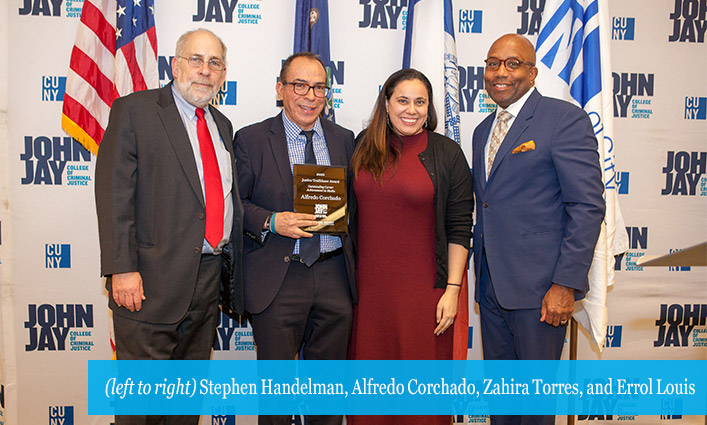
Considered a pioneer in chronicling life on the border, journalist Alfredo Corchado was recognized as this year’s Justice Media Trailblazer award recipient on February 20. The accolade, given annually by John Jay’s Center on Media, Crime and Justice (CMCJ), recognizes individuals who, through media, have advanced the national understanding of the 21st-century challenges of criminal justice reform. Given John Jay’s role as a Hispanic-Serving Institution (HSI) and the home of the first Immigrant Student Success Center in the City University of New York (CUNY) system, the College was the perfect setting to recognize Corchado’s incredible body of work as an advocate for people on the border.
“This tribute is not just about my work or me; it’s about my colleagues in Mexico who work in one of the most dangerous countries to practice journalism today. It’s about the people who trust me enough to share their stories; those voiceless souls seeking justice on both sides for the border.” —Alfredo Corchado
The event was emceed by Errol Louis from NY1 News and included a moving introduction of Corchado by Pulitzer Prize-winning author Zahira Torres. Coming up to the stage, Corchado thanked Torres for her words, and thanked the College, CMCJ Director Stephen Handelman, and Latin American and Latinx Studies Chair and Professor José Luis Morín and Professor Isabel Martinez for championing his writings. He then delivered a moving speech about what’s happening at the border, the history of the borderlands, the El Paso tragedy, and how storytelling makes way for the truth and gives a voice to the unheard.

“I accept this recognition on behalf of residents on both sides of the border. Especially the stubborn, resilient, courageous storytellers who still believe that truth matters in an ever-changing criminal justice system,” Corchado said at the start of his speech. “This tribute is not just about my work or me; it’s about my colleagues in Mexico who work in one of the most dangerous countries to practice journalism today. It’s about the people who trust me enough to share their stories; those voiceless souls seeking justice on both sides of the border; those seeking refuge for extreme poverty and violence—their stories are not very different from those that fled Europe in the 1800s.”

Acknowledging his own identity as “a son of Mexico and the United States,” Corchado told the audience of how his parents came to the United States when he was nine years old, in search of a better life. “My mother and father sacrificed all they knew in leaving Mexico and coming here. And they kept our family together no matter the challenges and questions we faced on our journey north,” he said.

“I am advocate for justice and I believe the truth is non-partisan. By telling the stories of those on the border, I can contribute to solutions or maybe those stories can form a bridge of understanding between my two countries.” —Alfredo Corchado
Speaking of the current administration, Corchado noted the dangerous narrative shift that has happened when discussing the border. “No matter what side of the border you're on, truth matters,” said Corchado. “The border has become ground zero for just about every imaginable pilot program aimed at keeping migrants away from U.S. soil, shrouded in secrecy.” Asylum policies like “Remain in Mexico” mean that the stories of migrants often go untold, according to Corchado. “Journalists struggle for access to tell the stories of migrants and asylum seekers. And, if we as journalists don't tell these stories, if we don't share their voices, there is simply no accountability; there is no public debate; their stories are erased.” It’s through telling the stories of those on the border, that the veil of secrecy is lifted and the truth is revealed. “My reporting isn’t just a beat. It’s not just another story for me. It is our story. Does that make me an advocate? Yes. I am advocate for justice and I believe the truth is non-partisan. By telling the stories of those on the border, I can contribute to solutions or maybe those stories can form a bridge of understanding between my two countries.”

Corchado ended his speech by recognizing the El Paso tragedy, the largest domestic terror attack targeting the Latinx community. He was celebrating his father’s birthday on that day when the heartbreaking news came in. “The alleged killer’s goals seemed obvious to me—erase my father’s story and that of more than 35 million Mexican-Americans,” said Corchado. “But the shooter obviously doesn’t know history or geography; the entire Southwest was once part of Mexico. Who’s invading whom? I thought. I felt heartbroken because if anyone believes in the promise and the greatness of this country, it’s my father and people like him. We’re probably more American because we believe in the immigrant soul of this nation, its ideals, its values, and the words we are ‘all created equal.’” In the wake of the tragedy, Corchado realized he needed to pack his bags and head to the border to tell truthful stories about those in the borderlands. “I headed for the firestorm to cover the latest mass killing and do the only thing I know how to do, write stories and push back with the truth.”
The Justice Media Trailblazers award ceremony capped off day one of the 15th annual John Jay/Harry Frank Guggenheim Symposium on Crime in America. This year’s two-day Symposium centered on prison reform and explored the innovative ways states across the country are creating meaningful change. Topics ranged from shifting the culture of incarceration from punitive to rehabilitative, to the importance of reentry programs.



